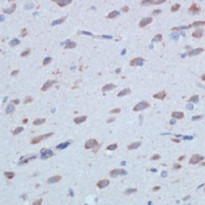ARG40104
anti-Neuroserpin antibody
anti-Neuroserpin antibody for IHC-Formalin-fixed paraffin-embedded sections,Western blot and Mouse,Rat
Overview
| Product Description | Rabbit Polyclonal antibody recognizes Neuroserpin |
|---|---|
| Tested Reactivity | Ms, Rat |
| Tested Application | IHC-P, WB |
| Host | Rabbit |
| Clonality | Polyclonal |
| Isotype | IgG |
| Target Name | Neuroserpin |
| Antigen Species | Human |
| Immunogen | Recombinant fusion protein corresponding to aa. 181-410 of Human Neuroserpin (NP_005016.1). |
| Conjugation | Un-conjugated |
| Alternate Names | Peptidase inhibitor 12; neuroserpin; Neuroserpin; Serpin I1; PI12; PI-12 |
Application Instructions
| Application Suggestion |
|
||||||
|---|---|---|---|---|---|---|---|
| Application Note | * The dilutions indicate recommended starting dilutions and the optimal dilutions or concentrations should be determined by the scientist. | ||||||
| Positive Control | Rat brain and Mouse brain | ||||||
| Observed Size | 46 kDa |
Properties
| Form | Liquid |
|---|---|
| Purification | Affinity purified. |
| Buffer | PBS (pH 7.3), 0.02% Sodium azide and 50% Glycerol. |
| Preservative | 0.02% Sodium azide |
| Stabilizer | 50% Glycerol |
| Storage Instruction | For continuous use, store undiluted antibody at 2-8°C for up to a week. For long-term storage, aliquot and store at -20°C. Storage in frost free freezers is not recommended. Avoid repeated freeze/thaw cycles. Suggest spin the vial prior to opening. The antibody solution should be gently mixed before use. |
| Note | For laboratory research only, not for drug, diagnostic or other use. |
Bioinformation
| Database Links | |
|---|---|
| Gene Symbol | SERPINI1 |
| Gene Full Name | serpin peptidase inhibitor, clade I (neuroserpin), member 1 |
| Background | This gene encodes a member of the serpin superfamily of serine proteinase inhibitors. The protein is primarily secreted by axons in the brain, and preferentially reacts with and inhibits tissue-type plasminogen activator. It is thought to play a role in the regulation of axonal growth and the development of synaptic plasticity. Mutations in this gene result in familial encephalopathy with neuroserpin inclusion bodies (FENIB), which is a dominantly inherited form of familial encephalopathy and epilepsy characterized by the accumulation of mutant neuroserpin polymers. Multiple alternatively spliced variants, encoding the same protein, have been identified. [provided by RefSeq, Jul 2008] |
| Function | Serine protease inhibitor that inhibits plasminogen activators and plasmin but not thrombin. May be involved in the formation or reorganization of synaptic connections as well as for synaptic plasticity in the adult nervous system. May protect neurons from cell damage by tissue-type plasminogen activator. [UniProt] |
| Cellular Localization | Secreted. Cytoplasmic vesicle, secretory vesicle lumen. Perikaryon. [UniProt] |
| Calculated MW | 46 kDa |
Images (2) Click the Picture to Zoom In
-
ARG40104 anti-Neuroserpin antibody IHC-P image
Immunohistochemistry: Paraffin-embedded Rat brain stained with ARG40104 anti-Neuroserpin antibody at 1:200 dilution.
-
ARG40104 anti-Neuroserpin antibody WB image
Western blot: 25 µg of Rat brain and Mouse brain lysates stained with ARG40104 anti-Neuroserpin antibody at 1:1000 dilution.







